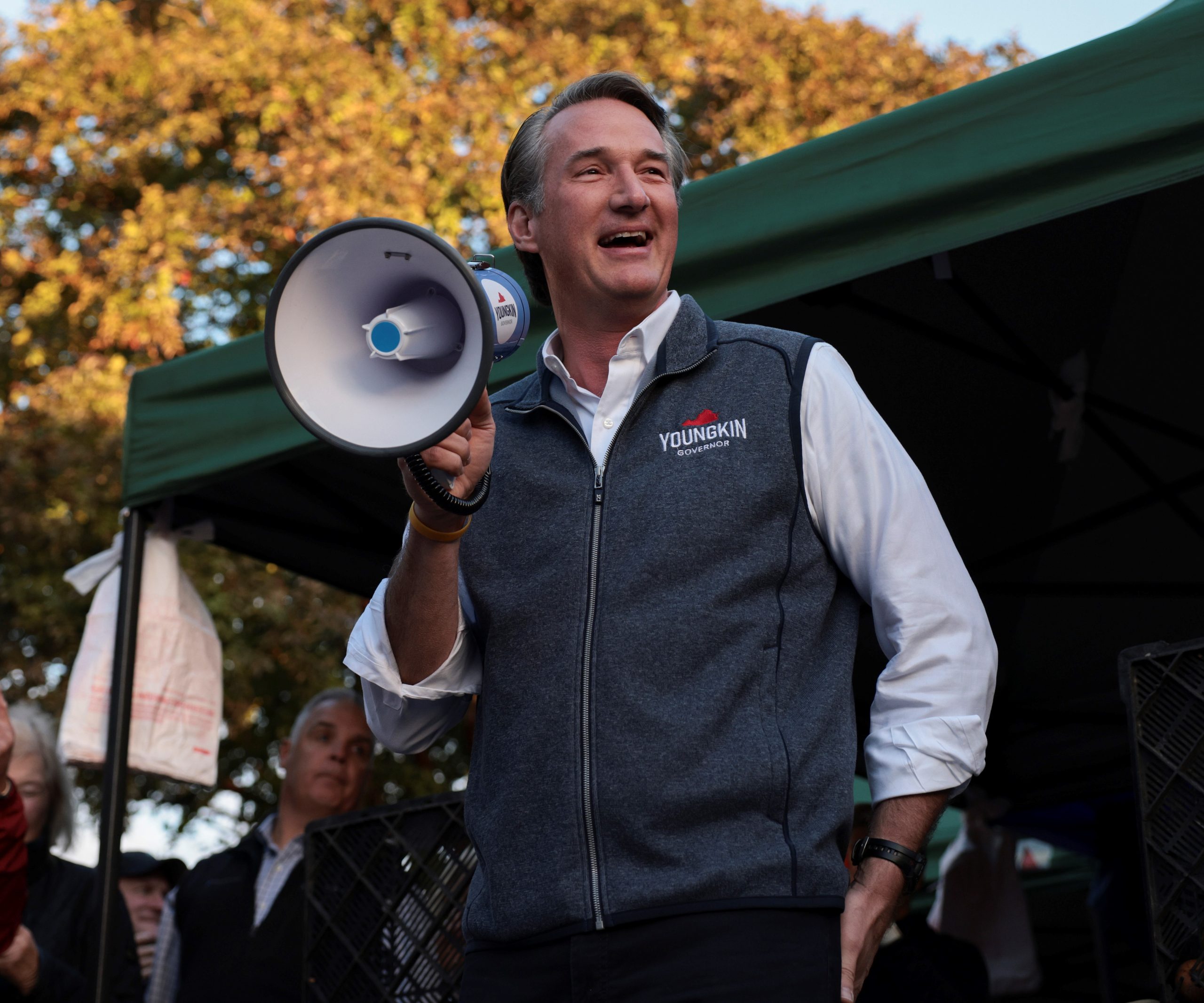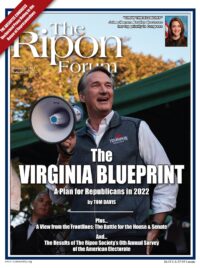
In Virginia, Governor-elect Glenn Youngkin’s victory, the Republican sweep of all three statewide offices and the pickup of more than enough Republican House of Delegates seats to bring them the majority (the State Senate was not up for reelection) can be credited to three factors: history, President Joe Biden, and candidate Glenn Youngkin.
History
Since 1977 and the birth of a competitive two-party system in Virginia, only once (in 2013) has the party of the sitting President won the Virginia governorship. Ten of the past eleven prior races went to the Party opposite the White House. The 2013 exception was Terry McAuliffe’s narrow win over Ken Cuccinelli, who at the time had to contend with a divided Republican party, a significant fundraising deficit, and a GOP-led government shutdown the month before Election Day.
Virginia voters tend to be counter cyclical and use the gubernatorial election to send the President a message.
President Joe Biden
When Donald Trump left the White House, Democrats lost the glue that held their coalition together. The Biden coalition was a dissonant one, united by an intense dislike of Trump. Independent voters swung to Biden to remove Donald Trump from their living rooms for the next four years. These same independent voters pumped the brakes this year.
Biden misread his mandate and Independents swung to Youngkin by a margin of 61-38 percent, sending a strong message to Democrats with regard to the upcoming mid-terms. And that message is: going left is going off the cliff. Independents will use 2022 to put a check on the President, rather than giving him a blank check.
Elections are about the future, and Glenn Youngkin epitomized a post-Trump party and post-COVID governance.
Polling substantiates that Biden’s honeymoon crashed and burned after the Afghanistan fiasco. Coupled with the challenges he is facing with regard to the border, inflation, and COVID, he is not likely to recover soon.
Glenn Youngkin
Glenn Youngkin had no public record and spent $20 million of his personal money, both of which aided in his victory. But money alone can’t elect a candidate. Ask Jaime Harrison in South Carolina, Sarah Gideon in Maine, or Amy McGrath in Kentucky.
Youngkin ran a smart, disciplined campaign. He is very likeable, and he outperformed Terry McAuliffe in the debates, while inspiring a broad coalition of voters who were looking for change. He stayed focused on state issues and talked about the future, while McAuliffe talked about Trump and focused on what he did as Governor in his prior term (from 2013-2017).
Elections are about the future, and Glenn Youngkin epitomized a post-Trump party and post-COVID governance. He navigated the Trump factor brilliantly in a state Trump not only lost by 10 percentage points, but where he is still upside down in the polls. Youngkin also outperformed Trump in rural areas. This can be attributed in part to the fact that McAuliffe’s attacks on him as a Trump clone kept Trump’s rural supporters on board. Beyond that, Youngkin’s dominating performance in rural Virginia demonstrates that Republican strength in rural areas is not merely a Trump phenomenon, but a manifestation of rural America’s antipathy to a Democratic Party controlled by coastal elites.
Youngkin also made inroads with minority voters on the education issue. Parents were frustrated, having endured a year of screen teaching, masking, and hearing about Critical Race Theory, while the Loudoun County School Board disciplined the father of a daughter who had been raped, and at the same time ignored the “gender fluid” rapist’s repeat offenses. McAuliffe, bought and paid for by the teacher’s unions, could only mutter that “parents shouldn’t be telling teachers what to teach,” alluding to his belief that parents should not be involved in the education of their children.
Youngkin gained with every constituency and in every jurisdiction, vis a vis the Republican Party’s 2017 and 2020 performances. But he had 10 points to make up from Trump’s 2020 loss to Biden and won by a close two-point margin. Make no mistake — Virginia remains a tough state for Republicans. But Biden’s poor performance and a great Republican candidate led the GOP to a sweep and their first statewide win in 12 years.
Make no mistake — Virginia remains a tough state for Republicans. But Biden’s poor performance and a great Republican candidate led the GOP to a sweep and their first statewide win in 12 years.
The biggest gains were in rural counties and exurbs. Should this trend continue into 2022, look for significant GOP gains in the U.S. House and Senate, resulting in a majority in both chambers.
Analysis
Although Youngkin ran statewide about six points ahead of Ed Gillespie in 2017 and Trump in 2020, the differences were not equal, as Youngkin ran well ahead of them in the Richmond and Hampton Roads exurban areas. In only one jurisdiction (Emporia) did he run behind Gillespie, and he exceeded Trump in all jurisdictions.
The interesting fact is that the voter turnout of about 55 percent exceeded anything the Commonwealth has witnessed in decades. Part of this may be attributed to the new 45 day, no excuse absentee and in person voting. Democrats carried absentees – heavily – but Republican turnout was through the roof.
Democrats cannot claim voter suppression, as they got their voters out. Indeed, McAuliffe received nearly 200,000 more votes than current Democratic Governor Ralph Northam received four years prior. However, Youngkin received nearly 500,000 more votes than Gillespie, who lost to Northam.
Coupled with Republican performances in New Jersey (where the GOP picked up eight House and four Senate seats), Long Island, South Texas, etc., it was a solid night for Republicans.
Republicans are positioned for a great mid-term election … Our challenge is not to make ourselves the issue.
Looking ahead to the 2022 mid-term elections, the 2021 election results are more than “a canary in a coal mine”. The reaction to Democratic control in Washington is swift and unmistakable. As Democratic Congresswoman Abigail Spanberger (VA-7) put it, “We elected Biden to be normal, not FDR.”
The last four times one party has controlled the U.S. House, the U.S. Senate, and the Presidency, the mid-term losses have been significant and the House has flipped. In 1994, the Democrats lost 54 seats. In 2006, the GOP lost 30 seats. In 2010, Republicans picked up 63 seats. And in 2018, the Democrats won 40 seats. Get the picture?
Republicans are positioned for a great mid-term election with one note of caution. Many voters are angry and are not enamored with Republicans and our agenda. They only want to use us to balance government. Our challenge is not to make ourselves the issue.
Democratic attempts to keep “the stolen election” and January 6th alive, to censure Paul Gosar, and to go after the hard right of the party are intended to make the mid-terms a choice election, not a referendum on them.
These tactics did not work for Terry McAuliffe and are unlikely to work in 2022, as mid-terms tend to be referendums on the incumbents.

Tom Davis served 14 years in the U.S. House of Representatives, representing the 11th Congressional District of Virginia. He also served as Chairman of the National Republican Congressional Committee from 1999 to 2002.




